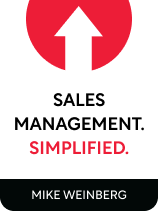

This article is an excerpt from the Shortform book guide to "Sales Management. Simplified." by Mike Weinberg. Shortform has the world's best summaries and analyses of books you should be reading.
Like this article? Sign up for a free trial here .
Is Mike Weinberg’s Sales Management. Simplified. worth reading? What is the key to sales success?
In Sales Management. Simplified., Mike Weinberg discusses how to successfully manage a sales team, including setting goals that push people to excel, using shadowing to identify team weaknesses, and training your people to make good sales calls. He also discusses a factor that he sees as crucial to managerial effectiveness: managing your time wisely.
Below is a brief overview of the key points.
Sales Management. Simplified.: The Straight Truth About Getting Exceptional Results from Your Sales Team
Sales expert Mike Weinberg believes that the problem in most struggling sales teams is an ineffective sales leader, not the team members. Thus, if a sales manager can learn how to lead their team effectively, overall team performance will improve. (Shortform note: Generally, sales commentators agree that sales teams with poor managers are doomed to failure. However, that doesn’t necessarily mean that all sales failures are the responsibility of the sales manager. Sales teams can struggle due to major economic turbulence or shifting customer needs—factors that sales managers can’t control.)
In Sales Management. Simplified., Weinberg discusses how to successfully manage a sales team. In this overview, we’ve grouped Weinberg’s advice thematically to create five management strategies:
- Hire good salespeople (and fire bad ones).
- Coach salespeople effectively.
- Create a sales strategy.
- Maintain a healthy sales culture.
- Focus on impactful managerial tasks, not non-managerial duties.
1. Hire Good Sales People
Sales roles are among the most difficult to fill, and once filled, new hires often aren’t effective at the position. Possible reasons for this dearth of talent include negative perceptions of salespeople driving people away from the profession and small businesses snapping up increasing numbers of salespeople to drive growth.
Weinberg advises against hiring general “salespeople” who are expected to complete every task in the sales process, from finding new leads, to retaining existing customers, to assisting customers with technical questions. Instead, he suggests making each sales role on your team clear and specific and hiring people with the skills needed to excel in their particular role.
In particular, Weinberg advises having distinct positions for account managers, who maintain relationships with current customers, and sales specialists, who seek out new business opportunities. In his view, it’s rare for a skilled account manager to be able to successfully do a sales specialist’s job, and vice versa.
2. Coach Salespeople Effectively
One of the reasons for high staff turnover in sales roles is that sales representatives often lack training in the essential sales skills (e.g. making cold sales calls, closing techniques, etc.) Therefore, coaching your sales team is essential to generating optimum performance.
To kick off your coaching, Weinberg recommends regularly shadowing your salespeople—either by conducting joint calls if they work in inside sales or joint visits if they work in field sales. You’ll gain firsthand knowledge of how each team member works, helping you to identify their strengths and weaknesses. You can then coach each person based on their weaker areas.
3. Create a Sales Strategy
A crucial element of strategic sales management is devising and communicating a clear sales strategy for your team to follow. Your sales strategy should highlight which customers or potential customers each team member should call, how they should prioritize these customers, and which products they should prioritize selling.
An effective sales strategy focuses on the most promising customer groups—in other words, those who can generate the company the most revenue. To figure out which customer groups are the most promising, you should analyze recent sales successes: What types of customers have been buying your product or service recently? Other customers with the same demographics may be promising leads.
4. Maintain a Healthy Sales Culture
A healthy sales culture is one in which salespeople feel respected, passionate, and happy in their roles. They communicate openly and respectfully with their manager and each other, and they’re willing to help out their colleagues in the pursuit of shared goals.
Weinberg outlines three techniques for fostering a healthy sales culture:
- Set goals and push people to achieve them
- Celebrate and reward salespeople’s high performance
- Avoid micromanaging or chasing personal glory
5. Focus on Impactful Managerial Tasks, Not Non-Managerial Duties
Weinberg cautions against falling into various bad management traps that harm your team’s culture. In his view, bad managers usually chase glory by taking credit for their team’s successes. They also micromanage their team or even try to do their jobs for them, rather than trusting their team members to work independently.
According to Weinberg, this behavior will only generate a culture of resentment and unhappiness among your team members. It’ll also demoralize them—what’s the point in working hard if your manager is going to do your job for you then take all the credit?

———End of Preview———
Like what you just read? Read the rest of the world's best book summary and analysis of Mike Weinberg's "Sales Management. Simplified." at Shortform .
Here's what you'll find in our full Sales Management. Simplified. summary :
- Why the problem with most struggling sales teams is an ineffective sales leader
- The five techniques to successfully manage a sales team
- How to create a sales culture where your team members feel respected and happy






